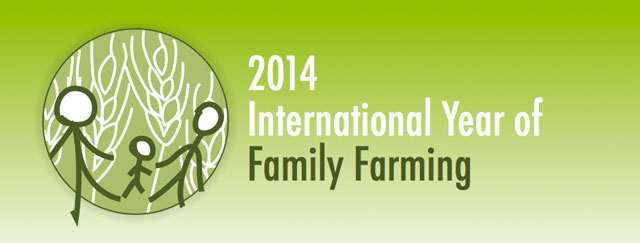 Editor’s Note: The United Nations has declared 2014 the International Year of Family Farming. The Ohio Farmers Union blog is highlighting this through a series of articles in 2014 focusing on particular aspects of independent, family agriculture.
Editor’s Note: The United Nations has declared 2014 the International Year of Family Farming. The Ohio Farmers Union blog is highlighting this through a series of articles in 2014 focusing on particular aspects of independent, family agriculture.
This month of October highlights two important aspects of family agriculture that are older ideas that are growing once again here in the U.S. through the many family farmers fueling the local food movement.
October is Cooperative Month and also Farm to School Month. Luckily, we still have many members still active in the Ohio Farmers Union who are old enough to remember when a great deal of our food came from the region in which we live. So called, “farm to school” wouldn’t have needed a boost in the early or mid twentieth century before technological advances in agriculture and transportation allowed for the consolidation of much of the business of growing and distributing what goes on our plates.
The same might be said for cooperatives. When I talk with farmers about the changes in farming over the years, it’s apparent that local and regional cooperatives ruled. In decades past, it was more likely that a grain farmer actually had what amounted to an equity stake in their local elevator if it was owned partially or wholly by local producers. Now, most elevator operations are not independent and tied to one of the huge agribusiness giants.
As family farmers get short shrift in the forest of tall trees that is increasingly the domain of the vertically integrated and multi-national corporations, cooperatives are gaining favor again and your kids’ or grandkids’ chances of eating locally grown food in their school cafeteria is increasing.
Through USDA Rural Development, there are now seven major programs that offer grants to public institutions and farmers themselves to help build and promote cooperative marketing programs. Your local farmers market may have even been helped off the ground with a bit of grant funding from the USDA or another group.
Farm to school has two components and is another USDA priority thanks to the local food movement and consumer and farmer interest in more sustainable agriculture. First, is getting more fresh, local food into school cafeterias. Second is to expose school kids to agriculture through gardening, farm visits and culinary classes. OFU has a member, Debra Eschmeyer, who is a nationally recognized expert in farm to school programs and the co-founder of Food Corps.
Take some time this month and consider your own context when it comes to cooperatives or farm to school initiatives. You can be a farmer or a consumer and do this. Do you support your local farmers market? Are you paying attention to the quality of what’s being served in your local schools? How has an agricultural cooperative you may belong to impacted your farm business? Answer these or one of your own questions about these issues and share what you come up with friends, family and on social media. Some of you may even want to follow in the footsteps of Deb Eschmeyer and others who have become activists for family farms and local food networks.
Here are a few facts from the National Farmers Union:
Cooperatives
One of the best tools available to family farmers to pool their resources and multiply both their buying and selling powers are through their involvement in farm cooperatives:
- Farm cooperatives also provide education and training for members, elected representatives, managers and employees so they can contribute effectively to the development of their cooperative. Members also inform the general public about the nature and benefits of cooperatives.
- Cooperatives are democratic organizations controlled by their members— those who buy the goods or use the services of the cooperative— who actively participate in setting policies and making decisions.
Farm to School
With the increased emphasis on eating local and knowing more about the farmer who produced the food you are consuming, consumers are increasingly seeking tools to education students about the food industry:
- Through education and outreach, consumers can be more directly linked with the farmers who raise their food. One such program, known as Farm to School, enriches the connection communities have with fresh, healthy food and local food producers by changing food purchasing and education practices at schools and preschools.
- In 2010, Congress designated October as National Farm to School Month to demonstrate the growing importance of farm to school programs as a means to improve child nutrition, support local economies and educate children about the origins of food.
- The National Farm to Cafeteria Conference is a biennial event that convenes a diverse group of stakeholders from across the farm to cafeteria movement.


Leave a Reply